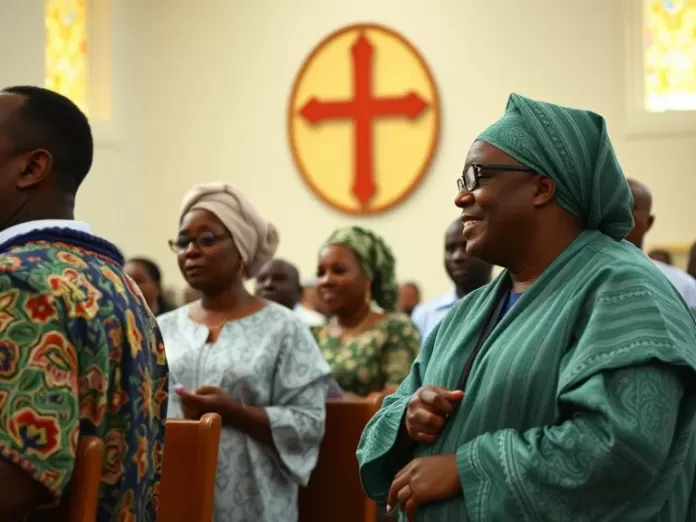Every December 25th is celebrated by christians worldwide to mark the birth of Jesus Christ. Christmas is a festive occasion marked by vibrant celebrations, family gatherings, and religious observances.
Yet, there are several Christian denominations in Nigeria that refrain from participating in Christmas celebrations. These churches, though small in number compared to the general population, believe that the holiday has roots in pagan practices or lacks scriptural backing, and they choose instead to focus on other forms of worship and spiritual observance.
Here’s a closer look at five Nigerian churches that do not celebrate Christmas and the theological, historical, and doctrinal reasons behind their decision.
Here are 5 Nigerian churches that do not celebrate Christmas:
1. Jehovah’s Witnesses
Jehovah’s Witnesses are one of the most notable Christian groups in Nigeria that do not observe Christmas. This decision stems from their belief that Christmas is rooted in pagan religious practices. While the group initially celebrated the holiday, they officially stopped in 1928.
The change in position was gradual. According to the book Jehovah’s Witnesses: Proclaimers of God’s Kingdom (1993), Christmas is associated with “false religious beliefs,” particularly those tied to Roman festivals like Saturnalia, which celebrated the sun god. Jehovah’s Witnesses argue that the Bible does not mention Jesus’ birth on December 25th, nor does it command believers to celebrate His birth.
For Jehovah’s Witnesses, celebrating Christmas is seen as unnecessary, as the Bible would have provided clear instructions if such a celebration were important. The group also warns against the commercialization and secularization of the holiday, emphasizing that Christians should focus on spiritual matters year-round rather than indulging in materialistic customs.
2. Seventh-Day Adventist Church
The Seventh-Day Adventist Church, which follows the Jewish tradition of worshiping on Saturdays (the Sabbath), also does not celebrate Christmas. The church’s stance is primarily due to the belief that the Bible does not provide a specific date for the birth of Jesus and does not command the celebration of His birth.
For Seventh-Day Adventists, Christmas is viewed as a commercialized event with pagan origins, notably the Roman winter solstice festivals, which were later integrated into Christian tradition. The church holds that celebrating Christmas detracts from true Christian worship and could lead to the distraction of materialism.
While the church officially refrains from celebrating Christmas, individual members may choose to mark the holiday with family gatherings or private reflection. However, the church encourages believers to remain focused on their personal faith and relationship with Christ rather than participating in secular rituals. The emphasis is placed on observing the Sabbath and living a Christ-centered life throughout the year.
3. Deeper Life Bible Church
Deeper Life Bible Church, led by Pastor W.F. Kumuyi, is another major church in Nigeria that does not celebrate Christmas. Kumuyi, who is known for his strict interpretation of the Bible, explained in 2013 that the church refrains from Christmas celebrations because of its idolatrous origins. According to Kumuyi, the practices associated with Christmas, such as the use of Christmas trees, songs, and the exchange of gifts, have no basis in the Bible or early Christian traditions.
The church’s rejection of Christmas is rooted in the belief that the holiday was adopted from pagan practices and is not aligned with the teachings of Jesus. Kumuyi has often emphasized that Christians should be wary of traditions that do not have a scriptural foundation, urging his congregation to avoid rituals that could detract from a pure and undiluted faith. Deeper Life Bible Church advocates for a lifestyle that is not dictated by seasonal holidays but by continuous devotion and adherence to biblical principles.
4. God’s Kingdom Society (GKS)
The God’s Kingdom Society (GKS), a Christian denomination founded in 1934 by St. Gideon Meriodere Urhobo in Nigeria, is another group that does not celebrate Christmas. GKS commemorates the birth of Jesus in October rather than December, observing an event known as “Freedom Day.”
READ ALSO: Christmas: Police, NSCDC tighten security, ban fireworks
The church rejects Christmas because of its association with pagan festivals, particularly the Roman Saturnalia festival, which honored the sun god. Urhobo, the founder of GKS, believed that the early Christian church had deviated from authentic biblical practices, and he sought to restore what he viewed as the original teachings of Christ. In GKS theology, the December celebration of Christmas does not align with biblical history or tradition, and they prefer to observe Jesus’ birth on a date they believe better matches historical and scriptural accounts.
By marking Jesus’ birth in October, GKS emphasizes a return to what they consider true Christian worship and values, steering clear of the “man-made” holiday customs associated with Christmas in December.
5. Mountain of Fire and Miracles Ministries (MFM)
Mountain of Fire and Miracles Ministries (MFM), led by Dr. Daniel Olukoya, is another prominent Nigerian church that does not celebrate Christmas. MFM’s rejection of Christmas is based on the belief that the holiday stems from pagan customs and lacks biblical justification. Dr. Olukoya publicly declared in 2019 that the church does not observe Christmas, explaining that the holiday’s origins are connected to the Roman Saturnalia festival, which celebrated the sun god.
Instead of celebrating Christmas, MFM organizes a special event called the “Power Must Change Hands” ceremony at the end of every month, with a major focus around New Year’s Eve. This event emphasizes deliverance, spiritual warfare, and prayer, highlighting the church’s priority of holiness and biblical purity. For MFM, Christmas is seen as a distraction from the core message of the gospel, which should be lived out daily, not tied to a single day of festivity.
Why Do These Churches Avoid Christmas?
- Pagan Roots: A common thread among these churches is the belief that Christmas has pagan origins. Many of the customs and symbols associated with the holiday, such as Christmas trees, the date of December 25th, and even some traditional songs, can be traced back to pre-Christian festivals. These churches argue that such practices are incompatible with true Christian worship.
- Lack of Scriptural Basis: None of these churches find any explicit biblical mandate for the celebration of Christmas. They believe that if the holiday were essential, the Bible would have clearly instructed Christians to observe it. Since the Bible does not mention Jesus’ birth date or command a celebration, these denominations prefer to focus on other spiritual practices, such as prayer, Bible study, and living out Christian values every day.
- Commercialization and Secularization: Another reason for rejecting Christmas is the commercialization and secularization of the holiday. Many of these churches believe that the true spirit of Christianity is overshadowed by materialism and excessive consumerism during the Christmas season. They view the holiday as an opportunity for worldly indulgence rather than a meaningful spiritual observance.
- Restoration of Biblical Practices: Some churches, like the God’s Kingdom Society, reject Christmas in favor of restoring what they believe are the original, untainted Christian practices. They emphasize the need for believers to live according to biblical teachings and avoid adopting traditions that have strayed from the early Christian faith.
Conclusion
While the majority of Christians in Nigeria celebrate Christmas with joy and fervor, these five churches offer a different perspective, urging believers to question the biblical foundations of the holiday.
For Jehovah’s Witnesses, Seventh-Day Adventists, Deeper Life Bible Church, God’s Kingdom Society, and Mountain of Fire and Miracles Ministries, Christmas represents a holiday that is rooted in pagan origins, lacks scriptural support, and often distracts from a true Christian life.
Instead, these churches focus on the consistent and ongoing practice of faith, urging their members to live according to biblical principles throughout the year.


